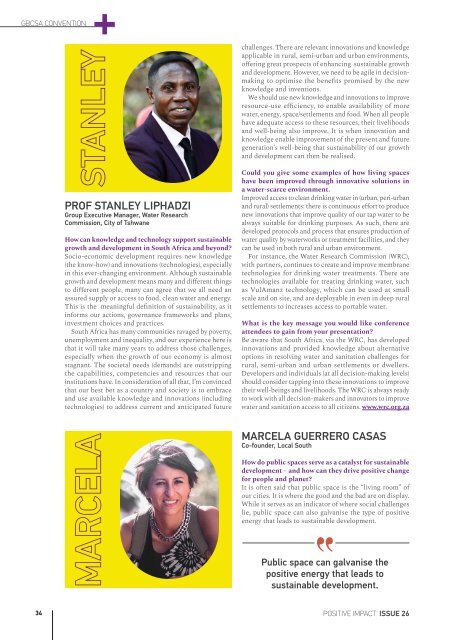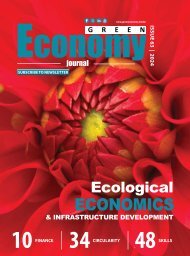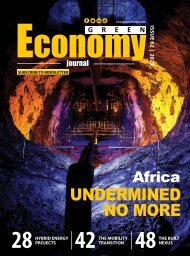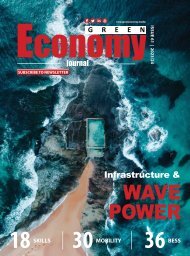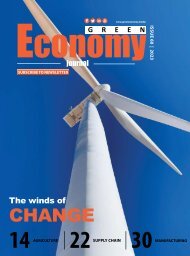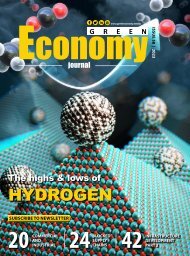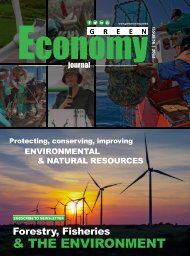+IMPACT MAGAZINE ISSUE 26
You also want an ePaper? Increase the reach of your titles
YUMPU automatically turns print PDFs into web optimized ePapers that Google loves.
GBCSA CONVENTION<br />
GBCSA CONVENTION<br />
STANLEY<br />
PROF STANLEY LIPHADZI<br />
Group Executive Manager, Water Research<br />
Commission, City of Tshwane<br />
How can knowledge and technology support sustainable<br />
growth and development in South Africa and beyond?<br />
Socio-economic development requires new knowledge<br />
(the know-how) and innovations (technologies), especially<br />
in this ever-changing environment. Although sustainable<br />
growth and development means many and different things<br />
to different people, many can agree that we all need an<br />
assured supply or access to food, clean water and energy.<br />
This is the meaningful definition of sustainability, as it<br />
informs our actions, governance frameworks and plans,<br />
investment choices and practices.<br />
South Africa has many communities ravaged by poverty,<br />
unemployment and inequality, and our experience here is<br />
that it will take many years to address those challenges,<br />
especially when the growth of our economy is almost<br />
stagnant. The societal needs (demands) are outstripping<br />
the capabilities, competencies and resources that our<br />
institutions have. In consideration of all that, I’m convinced<br />
that our best bet as a country and society is to embrace<br />
and use available knowledge and innovations (including<br />
technologies) to address current and anticipated future<br />
MARCELA<br />
challenges. There are relevant innovations and knowledge<br />
applicable in rural, semi-urban and urban environments,<br />
offering great prospects of enhancing sustainable growth<br />
and development. However, we need to be agile in decisionmaking<br />
to optimise the benefits promised by the new<br />
knowledge and inventions.<br />
We should use new knowledge and innovations to improve<br />
resource-use efficiency, to enable availability of more<br />
water, energy, space/settlements and food. When all people<br />
have adequate access to these resources, their livelihoods<br />
and well-being also improve. It is when innovation and<br />
knowledge enable improvement of the present and future<br />
generation’s well-being that sustainability of our growth<br />
and development can then be realised.<br />
Could you give some examples of how living spaces<br />
have been improved through innovative solutions in<br />
a water-scarce environment.<br />
Improved access to clean drinking water in (urban, peri-urban<br />
and rural) settlements: there is continuous effort to produce<br />
new innovations that improve quality of our tap water to be<br />
always suitable for drinking purposes. As such, there are<br />
developed protocols and process that ensures production of<br />
water quality by waterworks or treatment facilities, and they<br />
can be used in both rural and urban environment.<br />
For instance, the Water Research Commission (WRC),<br />
with partners, continues to create and improve membrane<br />
technologies for drinking water treatments. There are<br />
technologies available for treating drinking water, such<br />
as VulAmanz technology, which can be used at small<br />
scale and on site, and are deployable in even in deep rural<br />
settlements to increases access to portable water.<br />
What is the key message you would like conference<br />
attendees to gain from your presentation?<br />
Be aware that South Africa, via the WRC, has developed<br />
innovations and provided knowledge about alternative<br />
options in resolving water and sanitation challenges for<br />
rural, semi-urban and urban settlements or dwellers.<br />
Developers and individuals (at all decision-making levels)<br />
should consider tapping into these innovations to improve<br />
their well-beings and livelihoods. The WRC is always ready<br />
to work with all decision-makers and innovators to improve<br />
water and sanitation access to all citizens. www.wrc.org.za<br />
MARCELA GUERRERO CASAS<br />
Co-founder, Local South<br />
How do public spaces serve as a catalyst for sustainable<br />
development – and how can they drive positive change<br />
for people and planet?<br />
It is often said that public space is the “living room” of<br />
our cities. It is where the good and the bad are on display.<br />
While it serves as an indicator of where social challenges<br />
lie, public space can also galvanise the type of positive<br />
energy that leads to sustainable development.<br />
Public space can galvanise the<br />
positive energy that leads to<br />
sustainable development.<br />
Educating and engaging residents across the board<br />
is essential in this process. Interventions need not be<br />
a technical exercise; they can be creative and fun. Indeed,<br />
the potential for experimental and interactive initiatives is<br />
greatest in public space and it can show us a better future<br />
for people and planet alike. Public spaces can provide the<br />
opportunity to transform our cities, making them more<br />
pedestrian-friendly, dynamic and liveable places.<br />
There is a great opportunity for<br />
building new thinking, learning, and<br />
collaboration across the Global South.<br />
Please tell us about some of your work in shaping<br />
the urban landscape, specifically with regard to<br />
transforming neighbourhood-level engagement.<br />
There is no shortage of ideas when it comes to improving<br />
our cities; the challenge lies often in finding an appropriate<br />
way to implement them. At Local South, we support<br />
organisations and individuals working at the nexus of<br />
public and private sector with a special focus on urban<br />
issues. We believe that, in most cases, knowledge is<br />
already available, and unlocking ideas requires testing<br />
and validation. At the neighbourhood level, residents are<br />
best placed to guide those processes.<br />
We work to bring together experience, knowledge and<br />
dreams, while building on the opportunity to share across<br />
similar contexts. We help to localise ideas with those who<br />
FEZILE<br />
FEZILE DHLAMINI<br />
Founder, Green Scooter and Scooter Treats<br />
What led to your conception of Green Scooter, and<br />
what do you hope to achieve?<br />
I founded the company with the aim of introducing firstmile<br />
and last-mile transport options that could be adopted<br />
and applied in all types of markets. It was a problem that<br />
was marginally being solved in developed cities through<br />
technology, but none existed through the use of electric<br />
mobility. I’m working on building a technology company<br />
through automotive and other related products that could<br />
Public space is the “living room”<br />
of our cities.<br />
– like us – believe in the enormous potential of Global<br />
South cities. We do this through urban interventions,<br />
research and content development, strategy and project<br />
management, creative public engagement, and facilitation,<br />
brokering and special projects. We work with a range of<br />
partners across the private and public sectors.<br />
What would you like people to gain from your<br />
participation at the 2023 GBCSA Convention?<br />
Appreciation for the untapped potential in the Global<br />
South. It’s easy to feel despondent in South Africa because<br />
of the myriad challenges our cities face. This feeling is often<br />
exacerbated when we look to cities in the Global North.<br />
However, there are other cities with similar conditions,<br />
creatively addressing and overcoming challenges.<br />
There is a great opportunity for building new thinking,<br />
learning and collaboration across the Global South – to<br />
strengthen local work on the ground in different contexts,<br />
provide an opportunity to reflect in powerful ways, and<br />
allow for new thinking from the South to enter the public<br />
conversation in a meaningful way.<br />
When it comes to the built environment and public<br />
space, it is crucial to work towards global standards, while<br />
looking at how implementation is happening in similar<br />
cities. The work at Local South highlights the opportunities,<br />
particularly between Africa and Latin America.<br />
www.thelocalsouth.com<br />
be used to advance all or most parts of the planet. People<br />
first need efficiency to understand what that translates to<br />
in the environment.<br />
Have you encountered any barriers in the course of your<br />
eco-friendly transportation solution?<br />
There are several, but top of mind are, firstly, finance –<br />
nobody was willing to fund my venture and it was all risk,<br />
so I had to start another business as a cash cow and I used<br />
that to build what I have today. Secondly, access to market<br />
– everyone wants to stick with the “trusted” traditional<br />
brands and not risk new products they don’t understand<br />
first-hand, so I had to offer many free demonstrations!<br />
People first need efficiency to<br />
understand what that translates<br />
to in the environment.<br />
Any key takeaways youʼd like people to gain from your<br />
participation in the 2023 Green Building convention?<br />
Green Scooter is working on a few interesting concepts<br />
to make the entire ecosystem work – from an Electric<br />
Urban Society to the rural environments. Green Scooter<br />
has answers that many in the room would pay for and we<br />
would like for them to work with us and champion this new<br />
era of technology and a cleaner planet. We would share<br />
our SDGs and detail how we have conceptualised these<br />
frameworks to actually work. www.greenscooterza.com<br />
34 POSITIVE IMPACT <strong>ISSUE</strong> <strong>26</strong><br />
POSITIVE IMPACT <strong>ISSUE</strong> <strong>26</strong><br />
35


